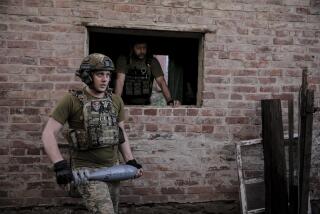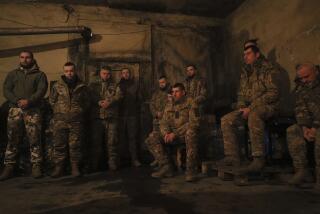Stay With an Air War for the Time Being : Land-war option is next big strategic decision: Be Careful
- Share via
Fiorello H. La Guardia, in his time a famous mayor of New York, had a motto he liked to intone whenever things looked bleak: “Patience and fortitude,” he would say. “Patience and fortitude.” The words are sound advice on any occasion when the spirit is tried, and never more so than in wartime.
The advice is especially relevant in the war now, because the early successes attributed to high-tech U.S. weaponry may have left many imprudently anticipating an early or even abrupt end to the conflict. Top political and military leaders from the beginning have responsibly cautioned against an excess of optimism, warning that war is full of unpredictabilities and hardships have to be expected. So as the war edges into its second week, a prescription for patience and fortitude remains sound. The advice is especially important for U.S. military planners as they ponder the best means to free Kuwait from the grip of Iraq’s occupying army.
The military, like President Bush, is distinctly uneager to engage in a prolonged conflict, meaning perhaps a war that stretches into summer. The natural tactical inclination of most military commanders, once they have massed their forces--as they have now in Saudi Arabia--is to move swiftly against the enemy. For a generation of military leaders still very aware of the lessons of Vietnam, there is also the thought that to delay could risk losing support from a public that was not enthusiastic about going to war in the first place.
These are valid points. But the issue is how to win this war in the most efficient way. The decision to start the ground war is the next big decision. Decide carefully; don’t rush; continue to rely on air power to every extent possible. Indeed, the United States should continue to use it as the primary tool to wear down Iraq’s war-making capability and induce its troops to quit the battle.
Casualties rise in proportion to the number of troops committed to the conflict. Even if a frontal assault against well-entrenched Iraqi troops in Kuwait is avoided--as most military experts say it should be--the odds are that any land battle will exact a considerable toll. At this moment there’s no discernible reason to rush into a ground war that could involve hundreds of thousands of troops on the allied side, most of them Americans, and invite thousands of casualties.
If the very formidable air armada being thrown against Iraq is as effective as military briefers have led the public to believe it is, then it should remain the primary weapon for weakening Iraq and isolating and demoralizing its troops. Air power alone won’t achieve victory. But over time it probably can be an effective means to hold down casualties. Certainly it should be given every chance to do that.
There is another reason for prosecuting the air war intensively and unremittingly. That is the opportunity (call it what it really is--the compelling need) to inflict the greatest possible damage on Iraq’s chemical- and nuclear-weapons programs and its means for waging offensive war generally. That is a priority objective, and not just to protect allied forces in the current conflict. It’s also vital to further the goal of regional political stability in the years ahead, to give peace a chance it would not otherwise have if Iraq were left in possession of terror weapons with which to intimidate its neighbors. Tuesday’s missile attack on Tel Aviv was one more hideous reminder of the vulnerability of neighboring states to Iraq’s unscrupulous use of indiscriminate weapons of destruction. Everything possible ought to be done to deny Iraq this capacity, now and in the years ahead.
The effort that is under way to cripple Iraq’s terror-weapons programs makes better sense than prematurely launching a major land offensive that is sure to dramatically increase casualties.
More to Read
Sign up for Essential California
The most important California stories and recommendations in your inbox every morning.
You may occasionally receive promotional content from the Los Angeles Times.













